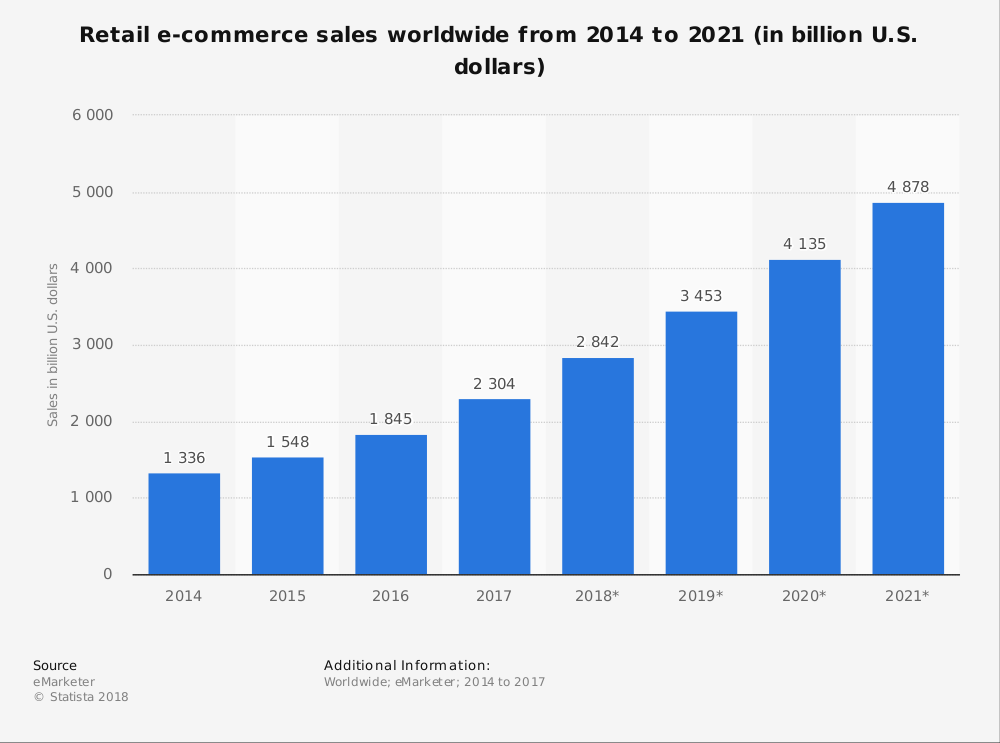Have you ever wondered how sellers choose their ecommerce marketplace? While it is easy to open an account in multiple places, there are finally few marketplaces which provide the best of footfalls and provide the value proposition that the seller is looking for. There can be various ways in which you can try and gauge the value a particular seller is looking at. To attract maximum buyers, you need to have quality sellers. Choosing the right mix of sellers is important for your platform and attracting them and convincing them to stay on your platform is equally important.
Reach and Growth of eCommerce Marketplace

This simple graph shows the increase in reach of the ecommerce marketplace among buyers with monumental growth. This has been the biggest reason why you should try to not just survive but be continuously in touch with the pulse of your sellers. The number of ecommerce marketplaces has grown exponentially and the trick to become a preferred marketplace by sellers is to understand their pain points.
Addressing the Pain Points of E-sellers
E-sellers are looking for a marketplace partner who can ease their burden and not add to it. So, to become a partner to ease their issues the common ones being as follows-
- Easy onboarding of Sellers – Ensure your ecommerce platform is designed for a quick and easy process of registration and uploading of their inventory. While technology now can ease many of these pain points, the presence and availability of your support staff is key to the process. Implementation is what will finally get the sellers hooked.
- Help Build Credibility – you need to show the results of your registered sellers vis-a-vis the performance matrix of other ecommerce platforms. This will help create a place in the minds of the sellers that you can provide them with genuine footfall and customers who have a potential to convert.
- Pre-Sales Support – Most sellers coming on multi-vendor ecommerce websites are small players or micro, home businesses who are not social media savvy or have no idea of how to showcase themselves. The ideal ecommerce partner would be who can build their content for them and use it on the ecommerce website to present them well. This will add to the marketing efforts of the seller and the ecommerce platform. The seller can rest easy on the fact that they do not need to hire a content writer and social media manager to help in online sales. They can focus on their downstream operations.
- Terms and Conditions – You as a marketplace have more say in the terms you settle in terms of pricing, sourcing, product type, selling conditions, returns and revenue share, fees and others. You have to focus the terms as per the size and revenue turnover of the sellers you are dealing with. Many of them can appreciate higher fees if they realise the backend and sales support you give. The communication of your features and support has to be done in their language in the effective manner so as to make them comfortable with you.
- Logistics and ERP support – As an advanced marketplace you can offer them logical support in terms of ensuring their goods are catalogued, warehousing can be centralized at your centers from where shipping can be done. This creates a seamless integration with the supply chain of the sellers to reduce any time lags of delivery. You can refer to professional ERP managers who can help you solve various aspects related to supply chain.
- Customer Support – This is a delight service which you can provide with a minimum charge to your vendor to allow them a space for customers to reach out and air their issues. It will also provide a more holistic and well-rounded service offering from your ecommerce platform to attract more vendors. Essentially you can allow sellers to focus on manufacturing and sourcing without the hassles of client management.
Ease their Business
Once your sellers are easy and comfortable to enlist with you, creating conversions of social media and digital engagements is the key which will finally ensure you remain the favourite ecommerce place for vendors. Growing at a CAGR of 21.2%, ecommerce marketplace logistics will cross $536 billion by 2022. Be perfectly poised to keep track of your vendors grievances, legal hassles and logistics issues by keeping them in the loop through a vendor association.
 Start using ZapInventory today
Start using ZapInventory today
